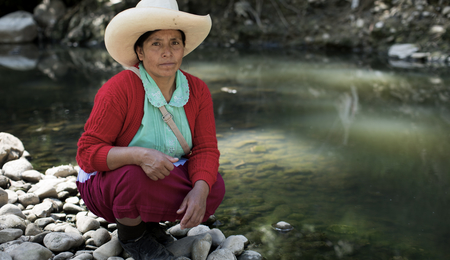The decision of the Peruvian Supreme Court to postpone the ruling on the case against human rights defender Máxima Acuña is the latest attempt by the authorities to obstruct her legitimate work to defend the environment, said Amnesty International.
The Peruvian Supreme Court was due to issue a decision today on the spurious charges of land invasion against Máxima Acuña Atalaya. The ruling was postponed until 3 May after the tribunal informed that some of the judges had not had enough time to reach a decision.
“The case against Máxima is a cowardly attempt by the authorities in Peru to stop her activism to defend human rights and the environment and send a message to other activists,” said Erika Guevara-Rosas, Americas Director at Amnesty International
“Effectively forcing her to travel all the way to Lima at her own expense just to be told that the hearing was postponed looks like yet another trick to continue to punish her and her family.”
“Instead of continuing to harass Máxima and her family with baseless accusations, authorities in Peru must ensure human rights defenders can carry out their work without fear of reprisals.”
Between 2011 and 2014, Máxima Acuña Atalaya reported several incidents of harassment, attacks and eviction attempts on the part of the Peruvian National Police.
On 14 February this year, a delegation led by Erika Guevara-Rosas, Amnesty International’s Americas Director, visited Máxima Acuña and her family to deliver more than 150,000 messages of support and solidarity collected from around the world. They called on the Peruvian government to protect her from any attack or act of harassment or intimidation.
That same day she was visited by the Minister for Justice and Human Rights in order to confirm the status of the implementation of the precautionary measures granted to Máxima Acuña by the Inter-American Commission of Human Rights.
Background
Despite a lack of evidence against Máxima Acuña, the Peruvian Attorney General’s office has pursued criminal charges against her since 2011, and brought the case to court. This added to the stigmatization of Máxima Acuña, who has been portrayed as a criminal by representatives of the Yanacocha mining company. They referred to her activities as “squatting” throughout 2015 and at the beginning of 2016, even though the issue of the ownership of the land is still awaiting legal resolution.
Read more
Peru: Human rights defender Máxima Acuña criminalized by unsubtantiated criminal prosecution for land invation (Public Statement, 15 March 2017)
For more information or to arrange an interview, please contact: Elizabeth Berton-Hunter, Media Relations 416-363-9933 ext 332 bberton-hunter@amnesty.ca





















